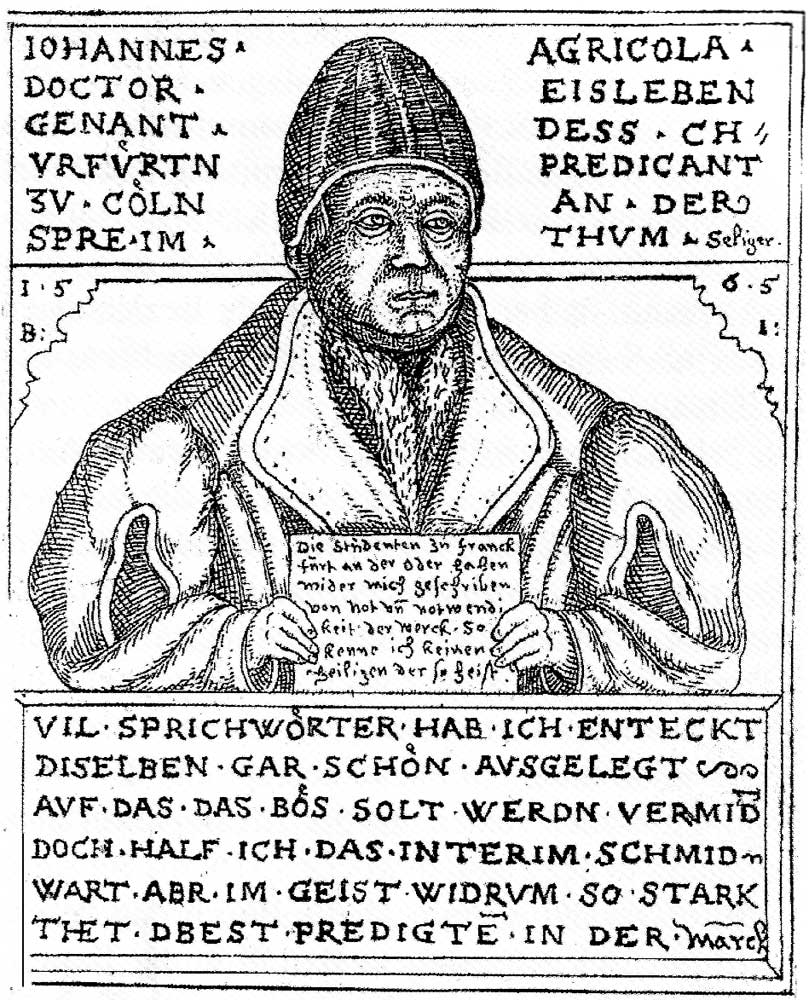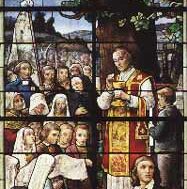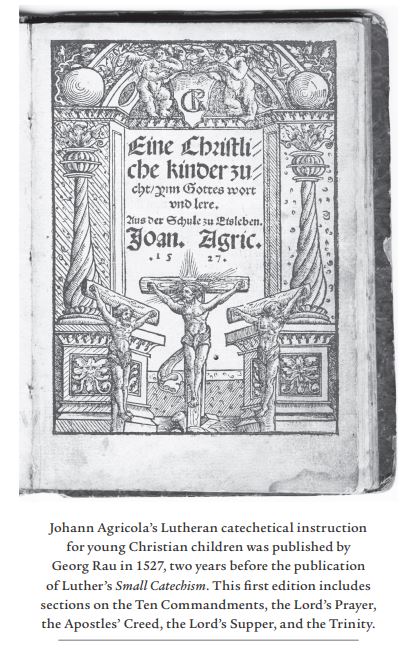Co-missioners,
Last week Carol Braun wrestled with questions about teaching children to pray. This week Paul Jaster draws from a little-known artifact of early Reformation history to imagine how today’s parents might anchor their children in some other essentials of the faith they get to use and enjoy.
Peace and Joy,
The Crossings Community
__________________________________________________________________
Johann Agricola’s Catechism for Girls
Adapted by Paul Jaster

Johannes-Agricola-Eisleben – From Wikimedia Commons
Early in 1525, Martin Luther asked one of his best and brightest students, Johann Agricola, to write a question-and-answer book for the instruction of children. In the summer of that year, Agricola returned to his hometown of Eisleben to become the rector of the newly established Latin School. After he was there for several years, he wrote a very simple catechism for the adjoining girls’ school, where his wife was probably the teacher.
Luther’s own catechisms came out a year or two later and were perhaps influenced by Agricola, especially when Luther says of the Introduction of the Lord’s Prayer: “Our Father…. What is this? With these words God wants to entice us, so that we come to believe he is truly our Father and we are truly his children, in order that we may ask him boldly and with complete confidence, just as loving children ask their loving father.”
Here is such a bold, loving conversation adapted from Agricola’s catechism from the section on Word and Sacraments. It would make a great skit for a youth drama.
+ + +
Picture a schoolgirl taking to her dad…and later, her pastor
On the Word of God
Girl: Dad, tell me about the Word of God.
Dad: It consists of two parts, Word and faith.
Girl: What does the Word do?
Dad: It promises something to you.
Girl: What does faith do?
Dad: Faith believes and trusts that God is true and that God will do what God promises.
Girl: What is God like?
Dad: God is too big for our minds to understand, but our hearts can hold on to God for dear life.
Girl: How is this announced to the world?
Dad: Through the preaching of the Gospel.
Girl: How does that happen?
Dad: God sends and selects people like our pastor, in whose mouths God places God’s word. God through the Holy Spirit is with the Word. And, because it is the Word of God, it never goes forth without results. So, people listen to their pastors’ preaching and believe their words. People see the mistakes they make and call to God for help.
Girl: What are the sermons of these sent ones called?
Dad: It boils down to two sermons, one called law and the other is called Gospel. In the Bible, the great preacher of the law was Moses. The great preacher of the Gospel was Jesus.
Girl: What do Moses and the law say?
Dad: That we should love God above everything else, otherwise it can lead to many harmful things from which God wants to protect us.
Girl: What do Jesus and the Gospel preach?
Dad: That God through Jesus forgives us when we do bad and hurtful things and makes in us new hearts. Or to put it another way: The Gospel says, I announce to you that God loved you first from the beginning and wants to bestow this love on you that you may love God, yourself, and others as well.
Girl: How does God do this?
Dad: You receive help from God for your body and your spirit.
Girl: What does God do to help my spirit?
Dad: As soon as your mother gave birth to you, God let you come to his Word of love and made you healthy, wanted, and believing in Baptism.
On Baptism
Girl: What is baptism?
Dad: It is a bath of rebirth.
Girl: What happens in baptism?
Dad: The pastor calls out the three special names for God, God the Father, God the Son, and God the Holy Spirit, and then washes you with water and makes the mark of a cross over your head with oil as a sign that you belong to Jesus and that Jesus goes with you wherever you might want to go.
Girl: How is baptism a bath of rebirth?
Dad: From the Word and faith we are rescued from the broken human nature that burns deep within you, me, and everyone else. It makes people do hurtful and harmful things at times. Like the nasty things that kids sometimes do to one another.
Girl: Do people still have this broken human nature deep within?
Dad: Yes, but through the giving of the Holy Spirit in baptism God holds it in check to help keep it under control. It’s like keeping the burning coals of a fire under control.
Girl: Give me an example.
Dad: Back when our country’s early settlers only had fireplaces and no other way of heating their wood houses, a mother would keep an eye on the fire in the fireplace during the day so that sparks did not turn into a raging fire and burn the house down. Before going to bed, she would cover the burning coals of the fire with ashes to keep those coals in check until the next day.
Girl: Does any of this fire still burn inside me?
Dad: You will discover that the older you get the more some old sparks will be stirred up and burst into flames in you.
Girl: How does that happen?
Dad: The devil has a strong breath. When he blows into people’s hearts, the ashes controlling the coals of fire blow away and the coals burst into flames again. Then the devil stirs up the world and fills you with unhealthy desires, a love for more and more things, anger, impatience, teenage drama, gossip, disbelief, drugs, risky sex, dishonest boys, an ugly attitude until your life is so full of this-and-that that it squeezes out God, Jesus, and the Holy Spirit.
Girl: How do I put the fire out?
Dad: Every time you feel a spark of this poisonous fire with in you, you should remember the three holy names for God, fall on your knees, and pray for God’s help as you struggle through life.
Girl: What is this struggle called?
Dad: Repentance.
On Repentance
Girl: How long will my struggles last?
Dad: As long as you live. So just as you might struggle every day, you should cry to God every day and admit your need for God’s help.
Girl: Will God listen to me every time I ask?
Dad: Yes, God is more inclined to give than you are to ask and receive. For that matter, God has more to give you than God ever has to forgive.
Girl: Does God like to be asked?
Dad: Oh, yes. You cannot do God a greater honor than that you expect many good things from God. You cannot do God a greater dishonor and disgrace than that you do not ask and expect much from God.
Girl: Who wouldn’t want to love God? Hasn’t God provided us with some further comfort, so that I might improve my faith and love, when it isn’t strong?
Dad: Yes, there is one more comfort?
Girl: What is it called?
Dad: The body and blood of Christ given to us in simple bread and wine. We call it the Lord’s Supper or Holy Communion. Let’s go talk to our pastor about it.
On Holy Communion

Fruchaud – Jean Clamens, Public Domain
Pastor: What do you want to know, my dear? Why are you here?
Girl: I want to pour out my need to God to you as one who stands in God’s place.
Pastor: Tell me, what is your need?
Girl: Me and my friends are growing up in years but also in troubling thoughts. Therefore, I ask you for God’s sake that, because of God, you would give me good advice and comfort and would ask God to help me.
Pastor: Yes, Yes. Because of God, who for this very reason allowed Jesus, God’s beloved Son, to die and rise again for you, I promise to you God’s forgiveness and that good favor we call grace. Do you need anything more?
Girl: I also desire something that I can see, touch, taste, and smell so that I know it is real and not just words. Think of it as medicine for my poisonous fire within.
Pastor: Tell me what that might be? What kind of medicine are you looking for?
Girl: I want to hear the Word of Christ concerning the forgiveness of the wrong things I think and do, attached to the bread and wine which is the body and blood of Jesus as a sign that a loving God wants to help both my body and my spirit. For I confess to God and to you, Pastor, that as truly as I see and chew the bread and smell and taste the wine, so truly God desires for the sake of Jesus to hold my weaknesses in check. Instead, God wants to strengthen my faith and give me the Holy Spirit.
Pastor: I have my home communion kit right here with bread and wine from last Sunday’s worship service. Take and eat the body of Christ. Take and drink the blood of Christ. To you and your friends, may the Word of God feed your spirits; the body and blood of Christ feed your bodies, so that you may be certain that God wants to preserve and nourish your bodies and spirits forever.
Girl: Praise God!
+ + +
Adapted by Paul Jaster for Crossings.org from “Johann Agricola’s One Hundred and Thirty Common Questions for the Young Children in the German Girls’ School in Eisleben: On God’s Word, Faith, Prayer, the Holy Spirit, the Cross and Love, as well as Instruction on Baptism and Christ’s Body and Blood”; translated by Timothy J. Wengert in Robert Kolb and James A. Nestingen, Sources and Contexts of The Book of Concord (Fortress Press, 2001).
Those using this as a youth drama may want to intersperse
songs, hymns, bible readings or portions of Luther’s Small and Large
Catechisms before and/or after sections.
Thursday Theology: that the benefits of Christ be put to use
A publication of the Crossings Community




You must be logged in to post a comment.